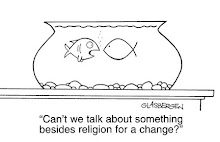BIBLICAL THEOLOGY
And Biblical Christian Spiritual Formation
Chapter One
Introduction:How are we to understand the flow and development of Christian Spiritual Formation in a Biblical historical sense? What are the historical highlights from a Biblical perspective that provide a comprehensive understanding of what it means to be spiritually formed over into the image of Jesus Christ?
Perhaps the best mechanism through which to accomplish this study is provided by scholars Bartholomew & Goheen in their text: The Drama of Scripture, who postulate the view of Biblical History as a "Six Act Play." While similar to the perhaps better known Reformed view of Biblical History: Creation, Fall, Redemption and Glorification, Bartholomew and Goheen's variation provides one additional critical piece having to do with the role and work of the institutional Church.
Act I – God Establishes His Kingdom: The Creation
The author of Genesis is careful to affirm that it was a Sovereign and omnipotent God that brought order out of chaos (Gen. 1:2; see also Jer. 10:12; Col. 1:17). In a concluding statement, Genesis 1:31 records: "God - Elohim [~yhil{a] saw all that he had made, and it was very good [daom bAj]. And there was evening, and there was morning-- the sixth day." In essence, by declaring His act of Creation "daom bAj", God is saying of the Created Order that it was perfect, without flaw or defect; whole, with nothing damaged or missing; complete, with nothing needing to be finished; pure, with no evidence of corruption; integrated fully and faultlessly balanced within and among all of its diverse components; and finally holy, set apart for the glory and purpose of God. And in particular, Mankind, the lovingly created apex and vibrant nodal point, around which all of the Created Order was organized, basked in the absolute fullness of Shalom.
An additional crucial thread to be indentified within the tapestry of Creational theology is that having to do with relatedness. In other words, each entity within the Created Order was not only intrinsically perfect and good in and of themselves; but each of those entities, in the most exquisite detail, was intrinsically perfect and good in their connectedness with one another. In essence, there was a faultless interrelatedness and integration of all relationships with one another; and it was by this condition of perfect integration that the whole of the Created Order experienced the state of Shalom. Quintessentially, all Creational forms and their functions were ideal in balance and harmony. Cornelius Plantinga Jr. offers the following description of Shalom:
This webbing together of God, humans, and all creation in justice, fulfillment, and delight is what the Hebrew prophets call shalom. We call it "peace," but it means far more than just peace of mind or cease-fire between enemies. (As a matter of fact, the area over which two armies declare a cease-fire may be acres of smoldering ruin.) In the bible, shalom means universal flourishing, wholeness, and delight – a rich state of affairs in which natural needs are satisfied and natural gifts fruitfully employed, all under the arch of God's love. Shalom, in other words, is the way things are supposed to be. (Plantinga 14-15)
Therefore for Man, to experience true Shalom it necessarily meant to be fully integrated, balanced and whole in the following arenas:
1. Between himself and God,
2. Between himself and others;
3. Within himself
4. Within the totality of the Created Order.
The state of Shalom means for all things relationally to be what they were supposed to be originally, in terms of their nature and in their relationships… This portrait of the Created Order (pre-Fall), is vital to understand for the Christian in the post-Fall era. because if we are to understand from which we must be saved regarding the evils of chaos and "dis-integration" (Rom 1:21, Eph 4:18);" then there must be a clear picture of what Christ intends to save Mankind to - and to restore us to our Pre-fall condition (Is 65:17, Acts 3:21)







No comments:
Post a Comment